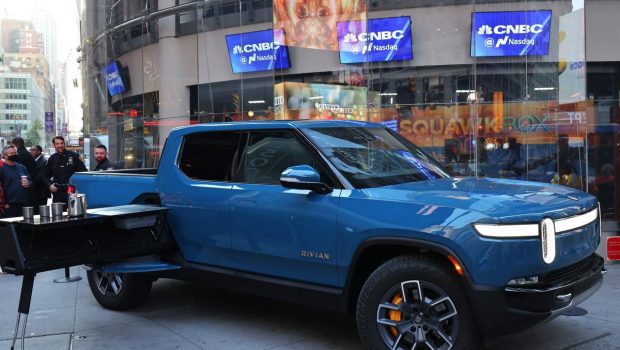Don’t be fooled by blind faith in technology and the market’s search for the next big thing
It is a quintessential experience of the 2020s to be reading news from the worlds of business or tech and be struck by the vague suspicion that everything is, well, a bit nuts.
A case in point: When electric carmaker Rivian went public this week, it had one of the biggest IPOs in history. At last check, it had a market cap of $100 billion (U.S.). For reference, the market cap of Ford — you know, the company that invented the assembly line and sold around 4 million vehicles last year — sat at a mere $77 billion.
Here is another number, though. As of October, Rivian has shipped 156 electric vehicles. That’s not a typo where I meant to write 156,000. It’s actually 156.
That is a staggering contrast. And in the disparity between Rivian’s market cap and its ability to ship product points to a lingering echo of the mistakes of the past — an almost magical belief that anything vaguely technological is inherently bound for success.
To be sure, the electric car has a bright future. Canada has committed to end sales of gas-powered cars by 2035. The Biden administration wants half of all cars sold by 2030 to run on batteries. Soon enough, millions will be driving electric cars — and some companies that make them will thrive.
Rivian, too, is better positioned than the absurdity of its current production numbers suggest. It is backed by Amazon, and with its enormous IPO, it has now access to a significant bed of capital.
But it’s hard not to be reminded of so-called “meme stocks” with Rivian. That term refers to the recent phenomenon in which activity on social media — primarily social news site Reddit — drove certain stocks like video-game retailer GameStop to dizzying highs.
It was an instructive example. GameStop’s business is dying. Microsoft, Sony, Nintendo and others are transitioning to vertically integrated digital models that entirely cut out the middleman of a games retailer.
But a belief in a vague of idea of “technology” led a group of motivated investors to ratchet up the company’s price after an activist investor was appointed to lead the transition to e-commerce. With its influx of meme stock cash, GameStop began working on transitioning to a “digital business model.” That means e-commerce (though of what sort no one’s quite sure) but also things like deploying the blockchain in games to do things like NFTs — essentially digital ownership for various forms of art or paraphernalia.
The thing about those technologies, though: they barely make any sense, let alone money. NFTs are, as far as anyone can tell so far, mostly a Ponzi scheme of digital musical chairs. The blockchain in games is just as ephemeral and thus far promises to be used mostly for peddling digital trinkets.
The bull case for GameStop is the sort of thing that ignores basic market realities. But the faith in some vague notion of “technology” has convinced a broad swath of people that a company that has a high chance of failing is in fact the future of games.
It’s a lesson that many appear unwilling to learn. While there is reason for cautious optimism with Rivian — early reviews of the vehicles are good, and the company is focusing on the key market segment of pickups and SUVs — the stunning and incongruent valuation of the company is just as likely to reflect investor desire to find the next Tesla as it is underlying economics.
That mix of a faith in technology and technology’s own echo chamber effect upon investors seems a potent and worrying combination. On Reddit, Twitter, and in digital media, tech companies are given breathless praise or glossy write-ups and the hype builds. As stock prices rise, often disconnected from an actual business case, the resulting concentration of capital is seen as proof of impending success, and the cycle continues.
Perhaps that’s a good thing — a sort of reclamation of the stock market from hedge funds and a return to the power of retail investors.
But it also seems as if the entire trend reflects a 21st-century belief that everything technological is inherently good and that we should charge ahead. Never mind, for example, that cities are likely better served by transit and a transition to electrified micromobility. Billionaire Elon Musk says that electric cars are the future, and so it must be.
Still, there are certain timeless truths: that sky-high valuations without profit can’t last forever, and that the excesses of the market eventually collapse in on themselves. It helps, though, to keep in mind that it is not technology that wins hearts and minds — or wallets — but compelling ideas, solid business models, and an eye to the future that doesn’t simply replicate the past. Anything else — well that way lies madness.








Gloss